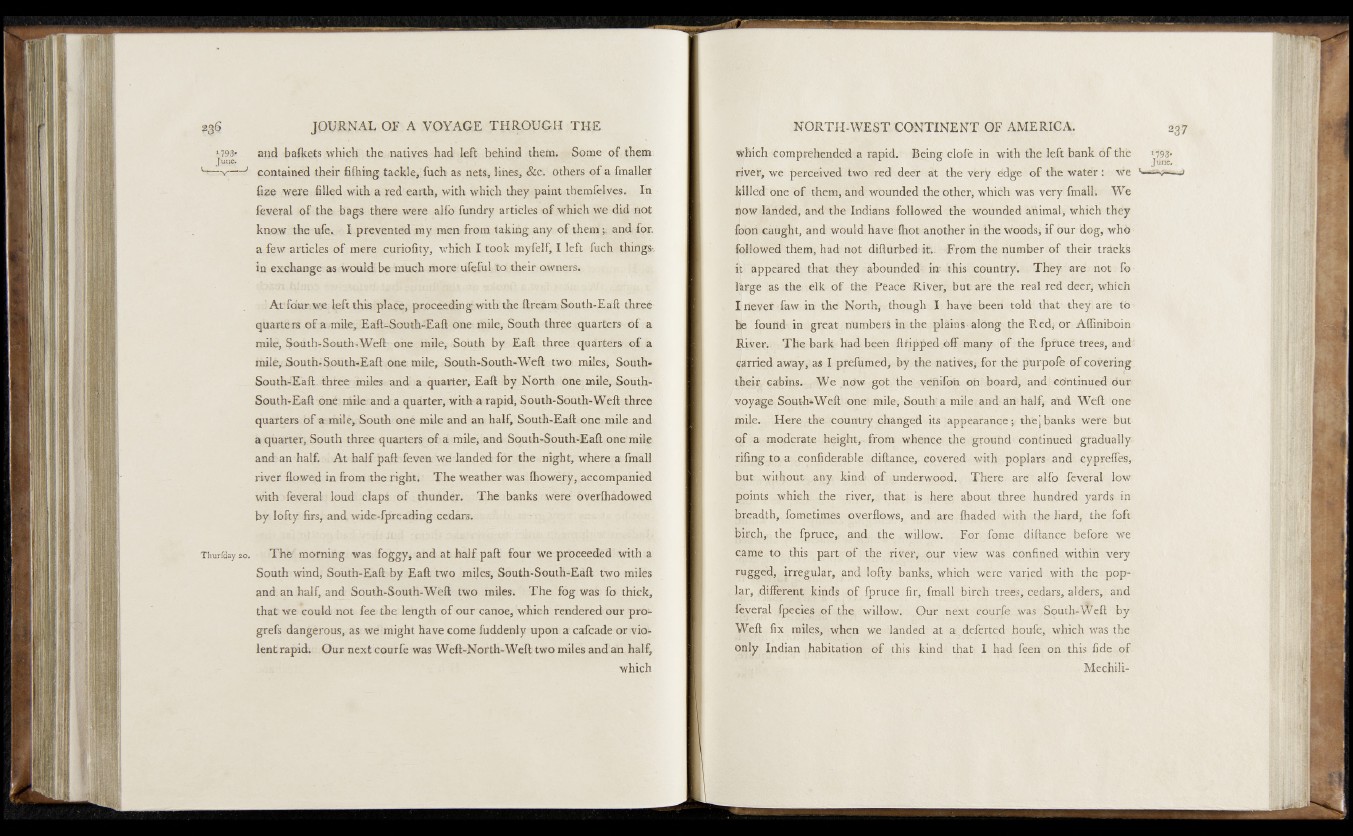
SiitHl and bafttets which the natives had left behind theta. Some of them
June.
t't=ss<^d contained their fiffiing tackle, fuch as nets* lines, &c. others aM few jp l
£3$ wete filled with a |ed earth, with which they paint thernfelyep. In
fesrend o f the bags there were alfo fundry articles -of wfitehtymdift ®ot
know the ufe. I.prevented my men from taking any. o f theta.;; and for.
a artteles o f mere cpiiofity, which I took myfelf, I lef^fuch things
in exchange a3 would be much more ufefuf “tto: their owners;.
AefdsmsBfi left this place, proceeding-with the ftre&mSonth-Eaift; three
quarters of a,ndbe,Ea[fts-Soinh?naft one mile, South three .quarters Of a
nute, SodtheSouth-Weft-one toile, South by Eaft three'.-, quarters of a
mile, South-South-Eaft .00®. mite, South^Sicmth-Wefti'tiwoj miles, South*
SoutbiEaft. three mites, and a quarter,Eaft sbjrNorih one mile^JSoutfc-
Sou th-Eaft • one mate/and a quarter, with a rapid, South-South* Weft three
quarters of a- mile, South one mile and an half, South-Eafl,one. mile and
a quarter, South three quarters of a taitej and South^SouthEaft <Mie mite
and an -halt I A t half paft (even Wd landed fdr jthe ,night, where a fmall
river, flowed in from the right; - The weather was.fboweiy, accompanied
with feveral loud claps o f . thunder. The banks were" ©verlhadowed
by lofty firs, and wide-fpreading cedars.
Thurfday ao. -u The'r morning, was foggy, and at half paft four we proceeded with a
South wind, South-Eaftb.y Eaft two miles, South-South-Eall two miles
and an half, and South.-South.Weft two miles. The fog was fc thick,
that we eouW not fee the lengths of our canoe, which rendered our pro-
grefis dangerous, as we; might have come fuddetdy upon, a cafeadeorvio*
lent rapid; Our next courfe was Weft*North-Weft two miles and an half,
which
which Comprehended;a mpid.* Being, clofedn with the left bank of the *f9|.
river, w.e perceived two/reddeeT at the vfery ddge of the water: we
killed’ one of them, and wounded the other, which was very finilli We
now landed, and th e Indians followed the wounded animal, which they
fbori caught, smd wbuldi have fliot another in the tvoods, if bur dog, who*
followed them, had not difturbed'it;. From the nlimber erf their tricks
k hppebrfed. that they abounded in/ this country. They ard not Fo
large as:the elk of the Peace RiVer, but are thfe. real red ddeipwliieh
l| rtevefdaw in the North/., though ,1 . havebeeri told1 that' they i are to *
he foultd- in great number! bn the. plains .along: thd Red; or Afliniboin
Riyer; The bark had been ftfipped.Off many of the fpr’uee trees, and
Carried away, as I pfefumed, by the natives, for the pbrpoffe of covering
their. Gabim.. j VFe ,ndw got the ydfiifoU oh; board, andrcetotmueddur
voya|gC'South*W^?;onef mil®, ^ uthf a mflefand’arih&lf, and Weft one
ipile. Here .the country changed» its :appe»ranqe;. th'ej banks were but
of a moderate height, from whence the ground* continued gradually
riling-.to. a .confiderable diftanqe, covered' yrith; . poplars and eypreffes,
but - without any. kind» ofpunderw;9®d- There aren alfo feveral low
points whieh, the river, that, is ,-here- about three hundred yards in
breadth,^fometim.es overflows, and. are ,(haded with the hard, the foft
bjijch,™ thp fprqee,) and > the , willow. For forae diftance before we
came to. .this part o f1, .the river/,our view was . confined, within very
rugged, irregular, and lofty banks, which /were; yarjed with the pop-
jar, .different kinds of lprace fir, fmall birch trees, cedars, alders, and
Hugral fpe^ies o f ihe willow. Our ne^at epur/e ,was ,South-Weft by
Weft jfi|t miles, ;when we landed at- a, defeptqd Jhoufe, whic,h was. .the
only Indian habitation of this kind* that I had- feen on. this fide.,of
Mechili